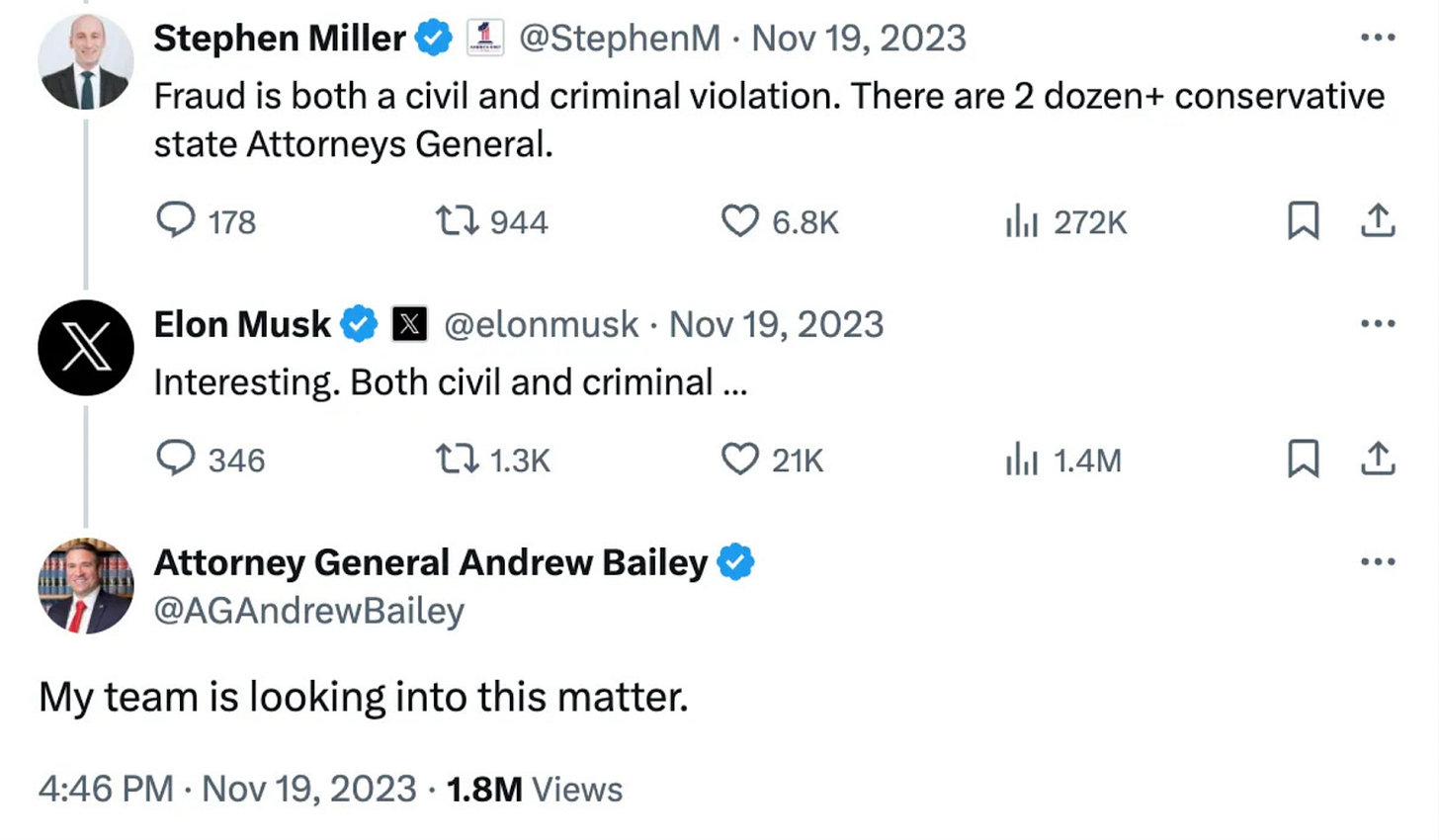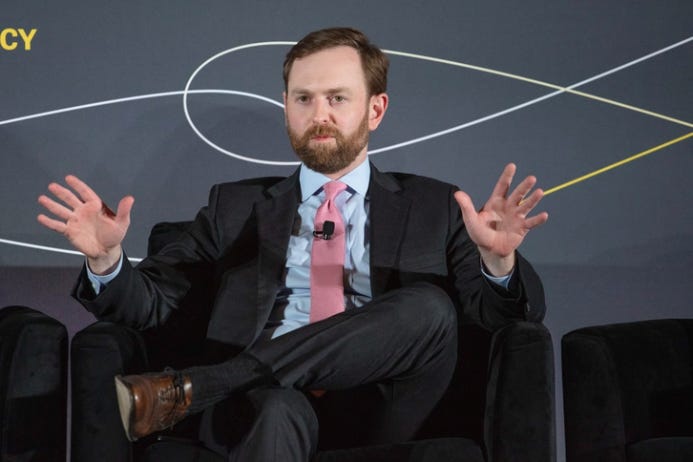Federal Judge: FTC Can't Be Musk's Speech Police
The First Amendment lives to fight another day
On November 16, 2023, the nonprofit news outlet Media Matters for America (MMFA) published an explosive story showing ads for major American companies on X (formerly Twitter) running next to explicitly pro-Nazi content.
The story sparked a massive exodus of advertisers and enraged Elon Musk, a self-described “free speech warrior,” who threatened to file a “thermonuclear lawsuit” against MMFA and its donors. It also marked the beginning of a relentless assault on Media Matters that escalated when Trump returned to the White House and the Federal Trade Commission (FTC) launched an investigation against MMFA, looking for possible antitrust violations.
Last week, a federal judge in DC ordered the FTC to back off its investigation, which she described as a blatant violation of the First Amendment. If her ruling stands, it will serve as a powerful template for people who are targeted by the administration to use as they stand up to weaponized attacks on disfavored speech and speakers.
The process is the punishment
Elon Musk made good on his promise and did indeed sue Media Matters, filing a tort claim in Texas, despite the fact that neither of the parties had any relationship with the state. (X was headquartered in California, and MMFA is headquartered in DC. A year after filing the lawsuit, X relocated to Bastrop, TX.)
Torts are civil claims for damages, and in the lawsuit, X claims that Media Matters manipulated the algorithm to generate images of the ads that were positioned next to Nazi content.
These types of lawsuits can’t be filed just anywhere, only in the place where the alleged injury occurred.. After more civil complaints in venues as far flung as Singapore and Ireland, a federal judge in California told X in April that it was no longer allowed to drag Media Matters into further expensive legal battles far from its tiny DC office.
But Musk didn’t stop there. He also enlisted multiple red state attorneys general in this harassment campaign, with an assist from Trump adviser Stephen Miller.
Attorneys general in Texas and Missouri both issued subpoenas to Media Matters on the legal theory that it defrauded its donors by claiming to be a news outlet when really it was engaged in nefarious “advocacy” against X.
A federal judge in DC blocked those subpoenas on First Amendment grounds, and the DC Circuit agreed, citing the “strong public interest in the exercise of free speech rights.”
But that wasn’t the end of the harassment for MMFA, which now had a big, red “X” on its back with Trump and his buddy Elon headed back to DC after the 2024 election.
The “pick me” FTC
In December of 2024, Trump announced that Musk’s DOGE would play a major role in running his upcoming administration. At the time, it wasn’t yet clear that the role would involve feeding entire federal agencies “into the wood chipper.” But it was obvious even then that pleasing Musk was one quick way to get in good with the Trump White House.
And so the two Republican commissioners on the FTC outdid each other in promising to use the agency to attack Musk’s enemies. In a wholly unrelated investigation of a sneaker website, they issued separate statements vowing to use the FTC to punish social media and other websites for daring to check facts and moderate content.
Commissioner Melissa Holyoak promised to use the FTC’s “consumer protection and antitrust authorities” to “reduce big tech’s ability to unlawfully remove Americans off their platforms.” This was an unsubtle endorsement of Musk’s claim that advertisers who boycott platforms because they don’t wish to be associated with racist or offensive speech are somehow violating the law.
In fact, the First Amendment and Section 230 of the Communications Decency Act explicitly protect the right of “big tech” (and everyone else) to lawfully refuse to host speech they don’t like. And the purpose of the FTC isn’t to apply “behavioral remedies” — pressure to get platforms to host speech they don’t like. It’s to enforce the law.
Republican Commissioner Andrew Ferguson was even more blatant. He, too, vowed to “vigorously enforce the antitrust laws against any platforms found to be unlawfully limiting Americans’ ability to exchange ideas freely and openly” and to “confront advertiser boycotts which threaten competition among those platforms.” Theoretically, it’s possible that some advertiser boycotts might well violate antitrust law. If, say, multiple companies banded together to demand that X lower its ad rate, that might result in an antitrust lawsuit against them.
But developing industry standards to ensure that brands don’t wind up with their ads next to Nazi content is not an antitrust violation, and no court has ever said that it is. Indeed, in 1982 the Supreme Court ruled that an NAACP boycott to support racial justice amounted to protected political speech, suggesting that an advertiser boycott would also be seen as protected speech rather than anticompetitive collusion.
But Ferguson knew he had to please Musk if he wanted the gig as FTC chair, so he embarked on a lobbying campaign that took him everywhere from Steve Bannon’s podcast to the Federalist Society. At every stop he promised to use the FTC to attack advertiser boycotts on antitrust grounds. On podcaster Mike Benz’s show, he even gushed that Musk’s telling advertisers to “go f**k yourself” was a “singularly great American moment.”
And it worked. On December 10, Trump announced his intent to nominate Ferguson as FTC chair.
Attack dogs attack
Ferguson wasted no time getting down to business. First he staffed up, hiring a senior policy adviser who had publicly branded Media Matters “scum of the earth.” His director of public affairs once tweeted that the agency was a bunch of “stupid and resentful Democrats who went to like American University and didn’t have the emotional stability to work as an assistant press aide for a House member.”
Ferguson was soon joined on the five-member commission by attorney Mark Meador. Meador had previously represented the conservative video streaming platform Rumble in an antitrust lawsuit against the World Federation of Advertisers (another frequent Musk target), along with several companies that refused to buy ads on a site that hosts everyone from conspiracy theorist Alex Jones to white nationalist Nick Fuentes.
Rumble’s complaint was filed in Texas, like the X suit. But Meador scored a different judge, and the case was appropriately dismissed for lack of venue.
Then, on May 20, the FTC issued a civil investigative demand (CID), essentially a document subpoena, to Media Matters. It sought a vast trove of internal agency records, including reporting materials.
The law requires that “each civil investigative demand shall state the nature of the conduct constituting the alleged violation which is under investigation and the provision of law applicable to such violation.”
But this subpoena made no such specification, instead gesturing vaguely in the direction of “an investigation to determine whether there is, has been, or may be a violation of any laws administered by the Federal Trade Commission.”
A month later, MMFA filed suit in the US District Court for the District of Columbia to block the FTC’s intrusive and expensive investigation.
Permission to speak freely
MMFA’s lawsuit alleged that the CID violated its First and Fourth Amendment rights. It claimed that fear of retaliation by the FTC caused it to back away from reporting on both X and Commissioner Ferguson’s own ties to various right-wing extremist figures.
“Chairman Ferguson’s use of the power of the agency is discouraging, and will continue to discourage, Plaintiff from engaging in news coverage,” it alleged. “The chill imposed by Defendants’ retaliatory actions injures Plaintiff’s ability to investigate and publish news stories and further chills its ability to participate in a robust public discussion around political extremism on X.”
The outlet asked the court to issue a preliminary injunction blocking the FTC’s investigation, and on August 15 Judge Sparkle Sooknanan granted that request.
“This case presents a straightforward First Amendment violation,” she wrote, adding that “a reporter of ordinary firmness would be wary of speaking again if she had to reveal the materials requested by this fishing expedition of a CID.”
She further rejected the government’s claim that the Federal Trade Commission Act does not allow the FTC to be sued for violating constitutional rights, along with an even more bizarre claim that the CID somehow wasn’t coercive until the agency took Media Matters to court to enforce it.
Judge Sooknanan did not point out the clanging irony that, even as it claimed to be protecting free speech (by arguing that advertiser boycotts are an unlawful restraint on social media platforms’ speech rights), it was actually restraining the speech of MMFA. But she did refuse to stay her order pending appeal, noting that the FTC is unlikely to succeed on the merits of the case and is unable to show irreparable harm from not being able to retaliate against Media Matters today.
The ruling will serve as a roadmap for other plaintiffs targeted by the government — particularly in light of the Trump administration’s habit of announcing its plan to retaliate against disfavored speakers.
It also shows how little deference the government now commands from the courts when it insists that of course everything is above board and beyond reproach. The days of the Justice Department being able to claim one thing in a legal filing while officials say the opposite on social media and on camera are over.
Liz Dye produces the Law and Chaos Substack and Podcast. Her work regularly appears on Legal Eagle, Above the Law, and Public Notice.












The insult and injury is that we are paying the bill for this administration to destroy our rights.
When we elect people like Donald Trump for president and Andrew Bailey as MO attorney general, we are the authors of our own destruction. As if that weren’t bad enough, then we pay them and their legions of attorneys to attack us.
Our only hope at this time is to support the organizations that fight these legal battles on our behalf, until we are able to vote these people out (assuming they haven’t rigged the system to where that’s no longer an option).
You understand the assignment.
Incredible reporting, thank you Liz! I was vaguely aware of this anti-free-speech campaign but not how it worked. It’s great that MMFA was able to thwart their illegal stifling of speech, but I wonder if there will be a way to remedy the harm these “pick me” people have caused them? Certainly a government official slandering the individual employees who work for an organization as “scum” and projecting weird political claims onto them seems at least vulnerable to a lawsuit. Can these free speech hypocrites be held personally financially and/or criminally responsible for what is obviously a weaponization of our government for petty grievances that were found to have no legal merit?
For everyone following along at home, here’s a reminder of how this story fits in with a larger picture of Musk’s selective principles and hypocrisy. Despite calling himself a “free speech absolutist,” Musk has repeatedly retaliated against speech he dislikes across his companies. He fired SpaceX employees who wrote an open letter criticizing his behavior, with the NLRB later ruling this was unlawful retaliation. He’s used NDAs and non-disparagement agreements to silence critics at Tesla and SpaceX, even trying to force customers to sign NDAs for car repairs. On Twitter, he suspended prominent journalists from CNN, NYT, and Washington Post who covered his jet tracker, and banned left-leaning activists like Chad Loder at the direct request of far-right figures. He’s also throttled traffic to news outlets he dislikes, labeled NPR and BBC as “state-affiliated media,” and completely abandoned Twitter’s previous practice of fighting government censorship requests abroad, instead complying with 100% of takedown demands in places like Turkey and India.
Meanwhile, the speech Musk does enthusiastically defend reveals his true priorities. He reinstated thousands of banned accounts including neo-Nazi propagandist Andrew Anglin, allowed massive spikes in racist and antisemitic slurs immediately after his takeover, ended Twitter’s COVID misinformation policy to let vaccine conspiracy theories spread freely, and personally promoted dehumanizing anti-trans content. He’s engaged with antisemitic campaigns like #BanTheADL, amplified conspiracy theories about the Paul Pelosi attack, and created a system where fewer than 30% of posts flagged for antisemitic hate are now removed. His approach has turned Twitter into what critics call a haven for extremists and disinformation spreaders, all while he claims to be defending a “digital town square” where the cure for bad speech is simply more speech.